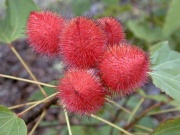Difference between revisions of "Achiote"
Jump to navigation
Jump to search
(username removed) |
(username removed) |
||
| Line 20: | Line 20: | ||
* ''Fairchild's Dictionary of Textiles'', Phyllis G.Tortora, Robert S. Merkel (eds.), Fairchild Publications, New York City, 7th edition, 1996 | * ''Fairchild's Dictionary of Textiles'', Phyllis G.Tortora, Robert S. Merkel (eds.), Fairchild Publications, New York City, 7th edition, 1996 | ||
| − | * | + | * Mary-Lou Florian, Dale Paul Kronkright, Ruth E. Norton, ''The Conservation of Artifacts Made from Plant Materials'', The Getty Conservation Institute, Los Angeles, 1990 |
[[Category:Materials database]] | [[Category:Materials database]] | ||
Revision as of 06:42, 24 July 2013
Description
Red colorant extracted from the bright colored seed pods of the achiote plant, Bixa orellana, native to Central and South America. Achiote, also called annatto, gives bright orange color to cotton and a pale pink color to silk. It is sometimes added to yellow dyes to provide a deeper color. Achiote has been used for paints on ethnographic objects (Florian, et al., 1990). It was also used as a textile and skin dye.
Synonyms and Related Terms
Bixa orellana; annatto; achiote (Esp.); achiote seed; achiotl; lipstick tree; urucum (Tupi)
Hazards and Safety
Color is not permanent.
Additional Information
M.Florian, D.Kronkright, R.Norton, The Conservation of Artifacts Made from Plant Materials, Getty Conservation Institute, 1990.
Authority
- Fairchild's Dictionary of Textiles, Phyllis G.Tortora, Robert S. Merkel (eds.), Fairchild Publications, New York City, 7th edition, 1996
- Mary-Lou Florian, Dale Paul Kronkright, Ruth E. Norton, The Conservation of Artifacts Made from Plant Materials, The Getty Conservation Institute, Los Angeles, 1990
